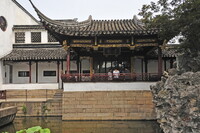| dc.coverage.spatial | Site: Suzhou, Jiangsu, China | en_US |
| dc.coverage.temporal | 1589-1926 (alteration); begun 1342 (creation) | en_US |
| dc.creator | Bei, Runsheng | en_US |
| dc.date | 1342 | en_US |
| dc.date.accessioned | 2013-10-17T18:54:23Z | |
| dc.date.available | 2013-10-17T18:54:23Z | |
| dc.date.issued | 1342 | en_US |
| dc.identifier | 238162 | en_US |
| dc.identifier.other | archrefid: 2527 | en_US |
| dc.identifier.uri | http://hdl.handle.net/1721.3/145931 | |
| dc.description | True Delight Pavilion, looking north across the pond; The Lion Grove Garden is famous for the large and labyrinthine grotto of taihu rock (from Lake Tai) at the garden's center. The name of the garden derives from the shape of these rocks which are said to resemble lions. These served as frequent subjects for artists such as Shen Zhou and Ni Zan. The Lion Grove Garden was first built in 1342 CE during the Yuan Dynasty by a Zen Buddhist monk, Wen Tianru in memory of his teacher Abbot Zhongfeng. At that time the garden was part of Bodi Orthodox Monastery (Pinyn: Puti Zhengzong). There were building phases in the 18th and 19th centuries. In 1917 Bei Runsheng, wealthy owner of a paint business, purchased the garden and finished the restoration in 1926. Many buildings and rocks date from this restoration. Bei Runsheng was the great-uncle of the architect I. M. Pei (Bei Yuming). It is recognized with other classical Suzhou gardens as a UNESCO World Heritage Site. Source: Wikipedia; http://en.wikipedia.org/wiki/Main_Page (accessed 8/5/2012) | en_US |
| dc.format.medium | taihu rock; wood; tile | en_US |
| dc.rights | © Scott Gilchrist, Archivision, Inc. | en_US |
| dc.subject | architecture | en_US |
| dc.subject | botanical | en_US |
| dc.subject | landscape | en_US |
| dc.subject | Gardens | en_US |
| dc.subject | Restoration and conservation | en_US |
| dc.subject | Yüan | en_US |
| dc.subject | Qing | en_US |
| dc.title | Lion Grove Garden | en_US |
| dc.title.alternative | Lion Forest Garden | en_US |
| dc.title.alternative | Shizi lin Yuan | en_US |
| dc.title.alternative | 狮子林园 | en_US |
| dc.type | image | en_US |
| dc.rights.access | Licensed for educational and research use by the MIT community only | en_US |
| dc.identifier.vendorcode | 2A2-CH-SU-LGG-J1 | en_US |
| vra.culturalContext | Chinese | en_US |
| vra.technique | carving (processes), construction (assembling), gardening | en_US |
| vra.worktype | historic site | en_US |
| vra.worktype | garden | en_US |
| dc.contributor.display | Bei Runsheng (Chinese landscape architect, ca. 1860-ca.1950) | en_US |


